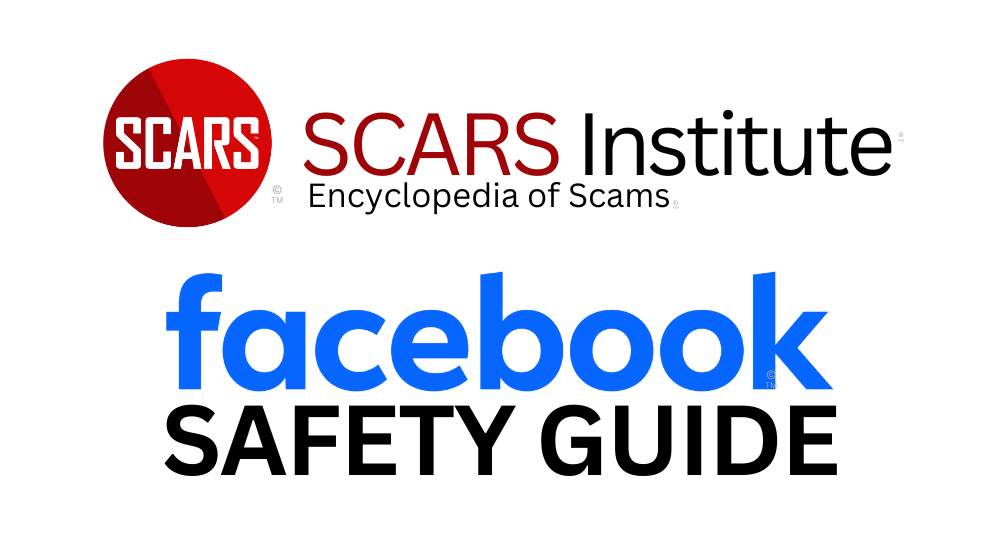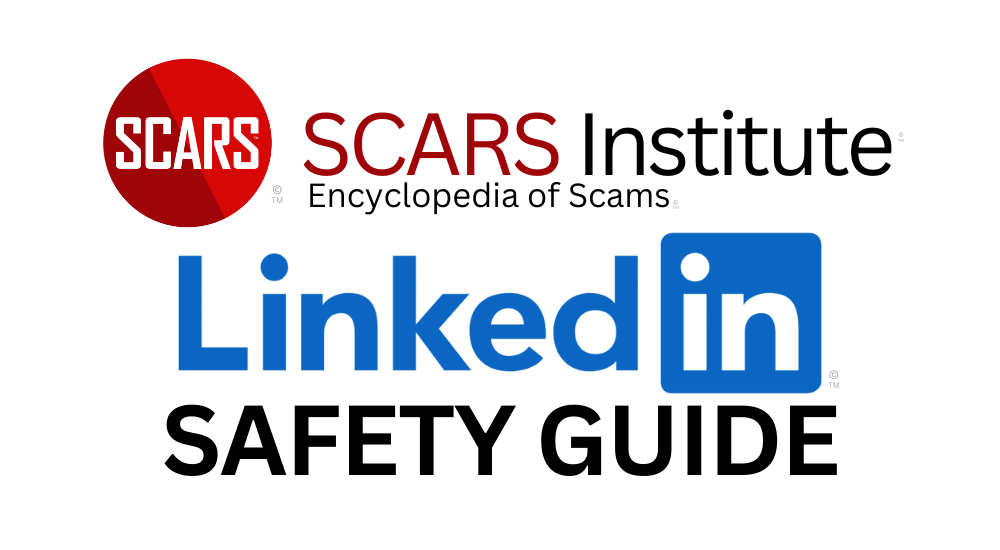
SCARS Institute’s Encyclopedia of Scams™ Published Continuously for 25 Years

Things Every LinkedIn User Should Do to Stay Safe and Protect Themselves from Scams
Tips for Staying Safe on LinkedIn
Online Safety – A SCARS Institute Insight
Article Abstract
LinkedIn, a platform with over 600 million users, is a prime target for scammers due to its vast and interconnected user base. Understanding the potential risks and implementing safety measures is crucial to protecting yourself from scams and maintaining your online security.
First, enhance your overall LinkedIn safety by using strong, unique passwords and enabling two-factor authentication. Customize your privacy settings to limit who can see your information and posts, and regularly review these settings to ensure they remain effective. Be cautious about the personal information you share, and always verify friend requests and messages before responding.
When participating in LinkedIn groups, research the group’s authenticity and understand its rules. Avoid sharing sensitive information and be wary of suspicious links or messages. Regularly review your group memberships and report any suspicious activity to the group admins and LinkedIn.
By staying informed about common scams and regularly updating your security practices, you can navigate LinkedIn more safely and enjoy a more secure online experience. Implementing these tips will help protect your personal information, prevent financial loss, and reduce the risk of falling victim to scams on LinkedIn.

50 Things Every LinkedIn User Should Do to Stay Safe and Protect Themselves from Scams
LinkedIn, the world’s largest professional networking platform, is a valuable tool for job seekers, employers, and professionals looking to connect and grow their careers. However, its popularity and professional focus also make it an attractive target for scammers and cybercriminals. With over 700 million users, LinkedIn provides ample opportunities for malicious actors to exploit unsuspecting individuals through various types of scams, including phishing attempts, fake job offers, and identity theft. The platform’s trust-based environment can sometimes lull users into a false sense of security, making them more vulnerable to sophisticated social engineering tactics.
Given the professional nature of LinkedIn, falling victim to a scam can have severe consequences, including financial loss, damaged reputations, and compromised personal and professional information. LinkedIn users must be vigilant and proactive in safeguarding their profiles and interactions on the platform. By following these 50 safety tips, users can better protect themselves from potential threats, maintain the integrity of their professional presence, and ensure a safer experience on LinkedIn. Understanding the risks and taking preventative measures can help users navigate the platform more securely and confidently.
50 Safety Tips for LinkedIn Users
- Use Strong Passwords: Ensure your LinkedIn password is complex, unique, and difficult to guess.
- Enable Two-Factor Authentication: Add an extra layer of security by enabling two-factor authentication.
- Beware of Phishing Emails: Be cautious of emails claiming to be from LinkedIn, especially those asking for personal information or containing suspicious links.
- Verify Connection Requests: Only accept connection requests from people you know or can verify.
- Customize Your Public Profile: Adjust your public profile settings to control what information is visible to non-connections.
- Limit Personal Information: Avoid sharing sensitive personal information such as your home address or phone number on your profile.
- Regularly Update Privacy Settings: Review and update your privacy settings periodically to ensure they align with your preferences.
- Be Wary of Job Offers: Research companies and job offers thoroughly before providing personal information or agreeing to interviews.
- Report Suspicious Activity: Report any suspicious messages or profiles to LinkedIn.
- Keep Software Updated: Ensure your browser and any LinkedIn apps are up-to-date to protect against security vulnerabilities.
- Avoid Clicking on Suspicious Links: Don’t click on links from unknown sources or in unsolicited messages.
- Use LinkedIn’s In-App Messaging: Communicate within LinkedIn’s messaging system to avoid potential scams.
- Check for Verified Companies: Look for the blue checkmark that signifies verified companies.
- Limit Access to Your Connections: Adjust your settings to control who can see your connections.
- Use Professional Headshots: Avoid using images that could be used for identity theft.
- Review Endorsements and Recommendations: Ensure they are from legitimate sources and accurately represent your skills.
- Monitor Account Activity: Regularly check your account activity to spot any unauthorized access.
- Educate Yourself on Common Scams: Stay informed about common LinkedIn scams and how to avoid them.
- Set Up Login Alerts: Enable alerts for unrecognized logins to stay aware of any unauthorized access attempts.
- Be Careful with Third-Party Apps: Limit the use of third-party apps that require access to your LinkedIn data.
- Regularly Review Your Connections: Periodically review your connections and remove any that seem suspicious.
- Keep Your Resume Updated and Accurate: Avoid including overly detailed personal information that could be exploited.
- Use LinkedIn Learning Securely: Be cautious of sharing personal data when enrolling in LinkedIn Learning courses.
- Don’t Share Login Information: Never share your LinkedIn login credentials with anyone.
- Be Skeptical of Too-Good-To-Be-True Offers: If an offer seems too good to be true, it probably is.
- Use Secure Networks: Avoid accessing LinkedIn over unsecured public Wi-Fi.
- Limit Profile Visibility to Search Engines: Control whether your profile appears in search engine results.
- Be Cautious with Personal Messages: Be wary of personal messages from unknown individuals, especially if they ask for money or personal details.
- Check Profile URLs: Verify that LinkedIn URLs are legitimate, especially when receiving job offers.
- Regularly Change Your Password: Change your password periodically to enhance security.
- Use LinkedIn’s Privacy Controls: Make use of LinkedIn’s privacy controls to manage who can see your profile and activity.
- Validate Job Postings: Check the authenticity of job postings by visiting the company’s official website.
- Avoid Sharing Sensitive Documents: Do not upload or share sensitive documents like your passport or social security number.
- Be Aware of Profile Cloning: Watch out for duplicate profiles that could be impersonating you or someone you know.
- Educate Your Connections: Inform your connections about potential scams and how to stay safe.
- Stay Updated on LinkedIn Policies: Keep up with LinkedIn’s latest security policies and recommendations.
- Use Secure Devices: Access LinkedIn from secure devices with updated antivirus software.
- Be Mindful of What You Post: Avoid posting information that could be used against you.
- Limit Interaction with Unknown Recruiters: Verify the legitimacy of recruiters before engaging in detailed discussions.
- Regularly Review Your Profile: Ensure there’s no outdated or overly personal information.
- Be Skeptical of Unsolicited Financial Advice: Avoid taking financial advice from unsolicited LinkedIn messages.
- Utilize LinkedIn Help Center: Use LinkedIn’s Help Center for security tips and to report issues.
- Avoid Oversharing in Groups: Be cautious about the personal details you share in LinkedIn groups.
- Review Data Download Requests: Be cautious about downloading data, ensuring it’s from legitimate sources.
- Participate in LinkedIn Webinars and Workshops: Engage in webinars that focus on LinkedIn security and professional networking best practices.
- Monitor Your Endorsements: Keep an eye on who is endorsing your skills and ensure they are legitimate.
- Verify Your Email Addresses: Make sure only your primary, secure email addresses are associated with your LinkedIn account.
- Be Cautious with LinkedIn Shortened URLs: Verify the destination of LinkedIn shortened URLs before clicking.
- Limit Career Information: Share enough career information to attract opportunities but not so much that it can be exploited.
- Stay Informed About LinkedIn Updates: Keep abreast of the latest LinkedIn features and security updates to stay protected.
By following these tips, LinkedIn users can significantly reduce their risk of falling victim to scams and enhance their overall security on the platform.
Learn About LinkedIn Privacy & Change Settings
To change your LinkedIn privacy settings, you can start by logging into your LinkedIn account and navigating to the “Me” icon at the top of your LinkedIn homepage. From there, select “Settings & Privacy.” In this section, you can adjust various privacy settings to enhance your security, such as who can see your email address, profile visibility to non-connections, and how others see your LinkedIn activity. You can also manage data sharing with third parties and control how LinkedIn uses your data. For a comprehensive guide on how to modify these settings, refer to LinkedIn’s own Help Center guide which provides detailed instructions on managing your privacy and security on the platform. Additionally, LinkedIn offers a Privacy and Security Center that provides valuable information and tips for keeping your account safe.
-/ 30 /-
What do you think about this?
Please share your thoughts in a comment below!
LEAVE A COMMENT?
Recent Comments
On Other Articles
- Arwyn Lautenschlager on Love Bombing And How Romance Scam Victims Are Forced To Feel: “I was love bombed to the point that I would do just about anything for the scammer(s). I was told…” Feb 11, 14:24
- on Dani Daniels (Kira Lee Orsag): Another Scammer’s Favorite: “You provide a valuable service! I wish more people knew about it!” Feb 10, 15:05
- on Danielle Delaunay/Danielle Genevieve – Stolen Identity/Stolen Photos – Impersonation Victim UPDATED 2024: “We highly recommend that you simply turn away form the scam and scammers, and focus on the development of a…” Feb 4, 19:47
- on The Art Of Deception: The Fundamental Principals Of Successful Deceptions – 2024: “I experienced many of the deceptive tactics that romance scammers use. I was told various stories of hardship and why…” Feb 4, 15:27
- on Danielle Delaunay/Danielle Genevieve – Stolen Identity/Stolen Photos – Impersonation Victim UPDATED 2024: “Yes, I’m in that exact situation also. “Danielle” has seriously scammed me for 3 years now. “She” (he) doesn’t know…” Feb 4, 14:58
- on An Essay on Justice and Money Recovery – 2026: “you are so right I accidentally clicked on online justice I signed an agreement for 12k upfront but cd only…” Feb 3, 08:16
- on The SCARS Institute Top 50 Celebrity Impersonation Scams – 2025: “Quora has had visits from scammers pretending to be Keanu Reeves and Paul McCartney in 2025 and 2026.” Jan 27, 17:45
- on Scam Victims Should Limit Their Exposure To Scam News & Scammer Photos: “I used to look at scammers photos all the time; however, I don’t feel the need to do it anymore.…” Jan 26, 23:19
- on After A Scam, No One Can Tell You How You Will React: “This article was very informative, my scams happened 5 years ago; however, l do remember several of those emotions and/or…” Jan 23, 17:17
- on Situational Awareness and How Trauma Makes Scam Victims Less Safe – 2024: “I need to be more observant and I am practicing situational awareness. I’m saving this article to remind me of…” Jan 21, 22:55
ARTICLE META
Important Information for New Scam Victims
- Please visit www.ScamVictimsSupport.org – a SCARS Website for New Scam Victims & Sextortion Victims
- Enroll in FREE SCARS Scam Survivor’s School now at www.SCARSeducation.org
- Please visit www.ScamPsychology.org – to more fully understand the psychological concepts involved in scams and scam victim recovery
If you are looking for local trauma counselors please visit counseling.AgainstScams.org or join SCARS for our counseling/therapy benefit: membership.AgainstScams.org
If you need to speak with someone now, you can dial 988 or find phone numbers for crisis hotlines all around the world here: www.opencounseling.com/suicide-hotlines
A Note About Labeling!
We often use the term ‘scam victim’ in our articles, but this is a convenience to help those searching for information in search engines like Google. It is just a convenience and has no deeper meaning. If you have come through such an experience, YOU are a Survivor! It was not your fault. You are not alone! Axios!
A Question of Trust
At the SCARS Institute, we invite you to do your own research on the topics we speak about and publish, Our team investigates the subject being discussed, especially when it comes to understanding the scam victims-survivors experience. You can do Google searches but in many cases, you will have to wade through scientific papers and studies. However, remember that biases and perspectives matter and influence the outcome. Regardless, we encourage you to explore these topics as thoroughly as you can for your own awareness.
Statement About Victim Blaming
SCARS Institute articles examine different aspects of the scam victim experience, as well as those who may have been secondary victims. This work focuses on understanding victimization through the science of victimology, including common psychological and behavioral responses. The purpose is to help victims and survivors understand why these crimes occurred, reduce shame and self-blame, strengthen recovery programs and victim opportunities, and lower the risk of future victimization.
At times, these discussions may sound uncomfortable, overwhelming, or may be mistaken for blame. They are not. Scam victims are never blamed. Our goal is to explain the mechanisms of deception and the human responses that scammers exploit, and the processes that occur after the scam ends, so victims can better understand what happened to them and why it felt convincing at the time, and what the path looks like going forward.
Articles that address the psychology, neurology, physiology, and other characteristics of scams and the victim experience recognize that all people share cognitive and emotional traits that can be manipulated under the right conditions. These characteristics are not flaws. They are normal human functions that criminals deliberately exploit. Victims typically have little awareness of these mechanisms while a scam is unfolding and a very limited ability to control them. Awareness often comes only after the harm has occurred.
By explaining these processes, these articles help victims make sense of their experiences, understand common post-scam reactions, and identify ways to protect themselves moving forward. This knowledge supports recovery by replacing confusion and self-blame with clarity, context, and self-compassion.
Additional educational material on these topics is available at ScamPsychology.org – ScamsNOW.com and other SCARS Institute websites.
Psychology Disclaimer:
All articles about psychology and the human brain on this website are for information & education only
The information provided in this article is intended for educational and self-help purposes only and should not be construed as a substitute for professional therapy or counseling.
While any self-help techniques outlined herein may be beneficial for scam victims seeking to recover from their experience and move towards recovery, it is important to consult with a qualified mental health professional before initiating any course of action. Each individual’s experience and needs are unique, and what works for one person may not be suitable for another.
Additionally, any approach may not be appropriate for individuals with certain pre-existing mental health conditions or trauma histories. It is advisable to seek guidance from a licensed therapist or counselor who can provide personalized support, guidance, and treatment tailored to your specific needs.
If you are experiencing significant distress or emotional difficulties related to a scam or other traumatic event, please consult your doctor or mental health provider for appropriate care and support.
Also read our SCARS Institute Statement about Professional Care for Scam Victims – click here to go to our ScamsNOW.com website.
















Thank you for your comment. You may receive an email to follow up. We never share your data with marketers.